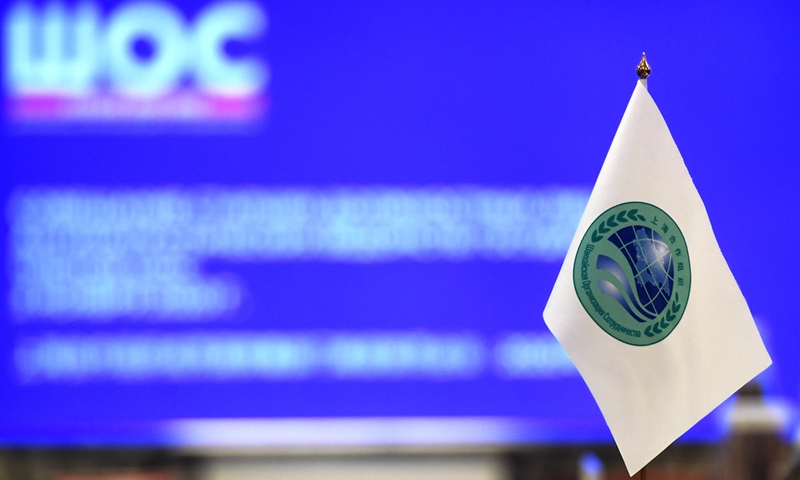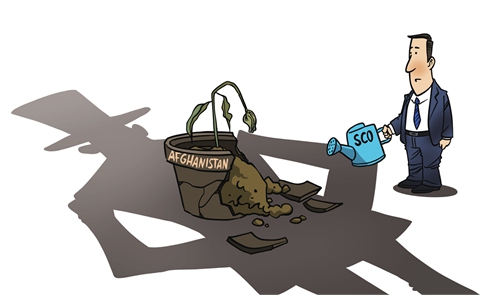
Shanghai Cooperation Organization (SCO) File photo
Tuesday marks the 20th anniversary of the founding of the Shanghai Cooperation Organization (SCO). As the largest, most populous and most extensive regional organization in Eurasia, the organization has achieved remarkable results with practical cooperation. Due to the participation of major countries such as China, Russia and India, the SCO has gained increasing attention for its possible role in global and regional governance. From the very beginning, the organization has been aiming at strengthening mutual trust in military and security among its member states, maintaining long-term stability in the region. It also seeks to become a pillar of the world's multi-polarization as well as an important power to oppose Western hegemony.The SCO has made adjustments in strategic positioning. At the beginning of its establishment, the SCO respected the different interests of its member states and gave priorities to resolving regional issues of concerns to all parties. For China, Russia and Central Asian countries, it is relatively easy to reach consensus on political and security matters. Since extremism, terrorism and separatism were very active at that time, the SCO was once regarded as a security coordination mechanism.
The organization was even interpreted by some Western media and scholars as the so-called Asian NATO created by China and Russia. They believed that the SCO may become the West's geopolitical opponent in Eurasia. In fact, the SCO is working hard to downplay the military security part, hoping to make achievements in multilateral economic cooperation. The SCO has also proposed to promote trade and investment facilitations. Meanwhile, it has been actively expanding cultural exchanges among its member states.
Due to the differences between member states' foreign policies and the surrounding environment, the SCO's cooperation goals and tasks are still mainly based on promoting cooperation and economic development among regional countries.
Therefore, SCO's cooperation framework is very broad. However, the process of multilateral cooperation in various fields is not balanced. When dealing with international affairs, on the one hand, the SCO expresses common stances. On the other hand, there are also obvious differences. Some member states are cautious on the issue of geopolitical confrontation with the West. This it is why the SCO made clear that it should carry out regional cooperation based on the principles of openness, transparency and non-targeting of third parties, from the very beginning.
The COVID-19 pandemic has profoundly impacted the world's development, and to some extent, reversed the process of globalization and regionalization. This is an unprecedented challenge, as well as a good opportunity for major countries and emerging markets such as China, Russia and India.
First, this change is reflected in the adjustment of international roles played by China, Russia and India. With the growth of their economic power, these countries are bound to have more international discourse power and right to participate in the improvement of international rules.
Second, such a change is embodied in the broader field of international competition. The major power competition may cause unforeseen global impacts. And no country can stand alone in the face of a global crisis.
Third, there is also a change in the reshaping of the world economic landscape due to scientific and technological progress. The continuous breakthroughs in the field of high technology have brought new variables to international economic relations.
Fourth, changes have emerged in a series of international systems, including the monetary system formed since World War II, and the trading system rebuilt after the Cold War.
Last, this change is demonstrated by the fact that there are more choices of the national system and development path for most countries.
In general, the SCO has gained a broader space for development while adapting to these changes.
The SCO is an extension of strategic cooperation between China and Russia at the regional level. In 2019, the two countries upgraded their relations to a comprehensive strategic partnership of coordination for a new era. At the same time, they have made a clear political declaration about maintaining global strategic stability.
After US President Joe Biden took office, the new administration has continued the policies of the former Donald Trump administration toward Beijing and Moscow. Adopting a dual-containment policy toward Russia and China, the US is attempting to form anti-Russian and anti-Chinese alliances and create frequent disturbances around the two countries. As a result, Beijing and Moscow face significant security challenges.
Under this circumstance, the political declaration of maintaining global strategic stability needs to be transformed into common actions that are sufficient enough to address real threats. Even though the SCO adheres to the principle of non-confrontation, it still holds a firm attitude in terms of maintaining global security, as well as opposing Cold War-like behaviors and bullying.
The SCO has chosen the non-Western path of development and strengthened the interactions among its members at the strategic level. Externally, this is because of the containment from the West. There are also internal driving forces, as the cooperation within the organization upgrades.
It is the SCO's choice to survive and develop in the increasingly fierce international competition, while proactively upholding the authority of the UN and the rules of international law. The SCO does not pursue zero-sum games. Nor will it become a military-political alliance. It will continue to oppose military interventions in other countries' internal affairs, and counter the brazen pressure from the West with joint development. That is the most effective countermeasure that the SCO can take.
The author is head at the Institute of Russian, Eastern European &Central Asian Studies of the Chinese Academy of Social Sciences. opinion@globaltimes.com.cn


